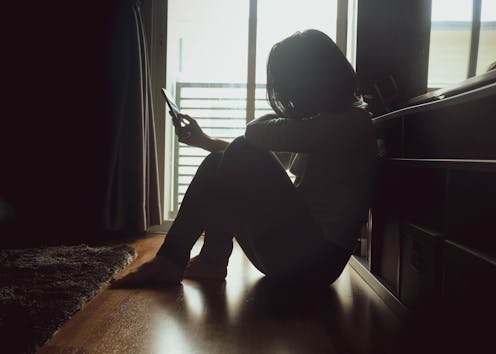COVID has changed how we live, how we die, and how we grieve
- Written by Lauren Breen, Professor of Psychology, Curtin University

Last week marked the second anniversary of the World Health Organization’s declaration of a pandemic[1].
In these two years, over 5,500 Australians[2] have died from COVID, and approximately 300,000 Australians[3] have lost their lives in total.
Necessary public health protections have affected people’s access to dying loved ones, limited their participation in important rituals like funerals, and reduced the physical social support they would otherwise receive from friends and family.
Read more: COVID pandemic 2nd anniversary: 3 things we got wrong, and 3 things to watch out for[4]
More than half reporting problematic grief symptoms
Australia has seen relatively low numbers of COVID infections and deaths, particularly prior to recent months. So understanding the impact of COVID deaths on the people left behind has meant looking overseas.
As a member of The Pandemic Grief Project[5], I partnered with overseas researchers to survey people in the United States who had a person close to them die from COVID.
We found[6] more than half (57%) of those surveyed reported problematic grief symptoms such as a change in identity, feelings of meaninglessness, and wishes to die, to a degree where psychological therapy would be advised.
Further, 70% of the sample coped with their loss using drugs or alcohol for at least several days in the past two weeks.
In our second study of people in the US who had a person close to them die from COVID, we found[7] most of the participants reported high levels of symptoms of generalised anxiety (70%), depression (74%), problematic grief (66%) and impaired functioning in key areas of life such as work, leisure and family relationships (63%).
Deaths from COVID versus other causes
These studies couldn’t tell us whether grief from a COVID death might be different to deaths from other causes. So we designed our next study to answer this question.
We surveyed people in the US who had a person close to them die from any cause during the pandemic. Nearly three-quarters (72%) reported problematic grief symptoms and 77% reported functional impairment.
When we compared those bereaved by losing someone to COVID to those whose loss was from another cause, we found no differences in levels of problematic grief symptoms or functional impairment.
Further, the three groups (those bereaved by COVID, another natural cause, or a violent cause) reported levels of functional impairment equal to or greater than bereaved people who had problematic grief prior to the pandemic.
We concluded[8] grief from deaths during COVID may warrant similar clinical concern as deaths from COVID.
What do these findings mean for Australia?
I’m part of team that designed a national study[9] to answer this question. We aim to understand the grief experiences and support needs of people in Australia who have been bereaved from any cause during the COVID pandemic.
So far, more than 2,000 bereaved Australians have participated to tell us about their experiences of grieving, the support they needed, and the effects of COVID public health measures on their grief.
Early results[10] suggest people who have lost a loved one during the pandemic are experiencing more grief, anxiety and depression than we would expect prior to the pandemic.
The study is open for recruitment until the end of March and you can access the survey here[11].
The team intends to develop a national bereavement action plan in coming months to help address grief support needs during the COVID pandemic and any future pandemics.
Read more: Coping with loss: We need a national strategy to address grief beyond the coronavirus pandemic[12]
Sustained struggles with grief
The international findings coupled with the preliminary Australian findings are a strong indicator that, as the pandemic continues, we’re likely to see sustained struggles with grief.
Bereaved people commonly seek support for their grief, yet my colleagues and I have found almost one-third[13] report not receiving the support they would’ve liked. Research from the UK shows the pandemic has exacerbated this gap[14] between support need and support received.
One reason for this gap is that all of us – individuals, health professionals and communities – need to be more grief literate. Grief literacy[15] combines the knowledge of grief and loss, values of compassion and care, and skills to enable supportive action.
Read more: As COVID-19 restrictions lift, grief literacy can help us support those around us[16]
The pandemic has shown more than ever we must do more to understand and support grieving people, strengthen their supporters and boost collective well-being in the wake of everyday loss and large-scale disasters.
References
- ^ declaration of a pandemic (www.who.int)
- ^ 5,500 Australians (covid19.who.int)
- ^ 300,000 Australians (www.abs.gov.au)
- ^ COVID pandemic 2nd anniversary: 3 things we got wrong, and 3 things to watch out for (theconversation.com)
- ^ The Pandemic Grief Project (sites.google.com)
- ^ We found (www.liebertpub.com)
- ^ we found (www.sciencedirect.com)
- ^ We concluded (www.tandfonline.com)
- ^ national study (www.lossandgriefduringcovid19.com)
- ^ Early results (palliativecare.org.au)
- ^ here (www.uts.edu.au)
- ^ Coping with loss: We need a national strategy to address grief beyond the coronavirus pandemic (theconversation.com)
- ^ almost one-third (journals.sagepub.com)
- ^ exacerbated this gap (journals.sagepub.com)
- ^ Grief literacy (www.tandfonline.com)
- ^ As COVID-19 restrictions lift, grief literacy can help us support those around us (theconversation.com)
Read more https://theconversation.com/covid-has-changed-how-we-live-how-we-die-and-how-we-grieve-177731

















